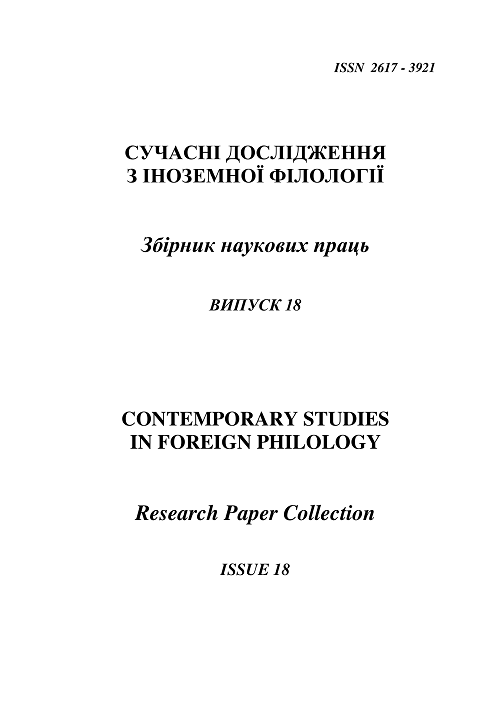Toni Morrison’s Sula: queering binaries, uniting traditions
DOI:
https://doi.org/10.24144/2617-3921.2020.18.239-250Анотація
This article analyzes Toni Morrison’s novel Sula from the point of view of feminist theory and queer theory. The novel inspired a lot of debates between scholars, who looked at various aspects of the novel, such as its complex web of relationships between and within genders, its take on race, and its exploration of female sexuality. While the term “lesbian” literature does not seem to fit the novel, the scholars agreed on the term “queer” literature. It can be explained by the fact that Sula depicts intense and existentially significant relationships between women, but without the sexual dimension. The article’s use of queer theory enables the researcher to view the novel, as well as the protagonist, within the queer continuum rather than through the binding approach of fixed gender and sexual identities that were not necessarily typical in African American communities. The article turns to the African religions references in Sula, such as the beliefs of the Yoruba people, encoded by Toni Morrison in particular Sula herself being an embodiment of Aje, the spirit of female power. We can see that Toni Morrison also skillfully employs the Western tradition, and this is what makes Sula so complex and so prone to be analyzed with the help of queer theory – the binaries in this text are not fixed and open to interpretation. Though the African matrix is not directly related to queer theory, it is a part of the meaning of the text. The author also turns to the European medieval tradition of “misrule.” All these identities only lock black womanhood in. Paradoxically, a black woman’s safe space, the shelter of her stability is rooted in fluidity – perhaps, alluding to the waters and the river gods and spirits of the African ancestors whom Toni Morrison summons to this world. The world that in its Western dimension appears to be “misruled,” “carnavalesque” and “upside down” – it all depends from what angle to look at. The article concludes that the novel, and the character of Sula, strives to dismantle the biases of white feminism, as well as the epistemological binaries of and western discourse.
Keywords: feminist, queer, race, identity, compulsory heterosexuality, Yoruba tradition, Aje, epistemological binary.
Посилання
Bergenholtz Rita. Toni Morrison’s Sula: A Satire on Binary Thinking. African American Review. 1996. 30.1 P.89-98
Bronski Mason. ”There’s something about Harry”. Weekly Planet. 2003. 07/31
Foucault Michel. Two Lectures. Power/Knowledge. New York: Pantheon Books, 1980. P. 78-108.
Harris Laura Alexandra. Queer Black feminism: the pleasure principle. Feminist Review. 1996. 54. P.3-30
Humphrey Chris. The politics of carnival: festive Misrule in Medieval England. Manchester: Manchester UP, 2001.
Lewis Vashti Crutcher. African tradition in Toni Morrison’s Sula. Phylon. 1960. 48.1 P.91-97.
McDowell Deborah. “It’s not safe. Not safe at all”: sexuality in Nella Larsen’s Passing. The Lesbian and Gay Studies Reader. New York: Routledge, 1993. P.616-625.
McDowell Deborah. New directions in Black feminist criticism. African American literary theory: a reader. New York: New York UP, 2000. P.167-177.
Morrison Toni. Sula. New York: Vintage, 2004.
Smith Barbara. “Toward a Black feminist criticism.” The new feminist criticism: essays on women, literature and theory. New York: Pantheon Books, 1985.
Stokes Mason. White heterosexuality: a romance of the straight man’ burden. New York: Routledge, 2005. P.131-150.
Washington Teresa. Our mothers, our powers, our texts: manifestations of Aje in Africana literature. Bloomington: Indiana UP, 2005.
##submission.downloads##
Номер
Розділ
Ліцензія
Автори, які публікуються у цьому журналі, погоджуються з наступними умовами:
- Автори залишають за собою право на авторство своєї роботи та передають журналу право першої публікації цієї роботи на умовах ліцензії Creative Commons Attribution License, котра дозволяє іншим особам вільно розповсюджувати опубліковану роботу з обов'язковим посиланням на авторів оригінальної роботи та першу публікацію роботи у цьому журналі.
- Автори мають право укладати самостійні додаткові угоди щодо неексклюзивного розповсюдження роботи у тому вигляді, в якому вона була опублікована цим журналом (наприклад, розміщувати роботу в електронному сховищі установи або публікувати у складі монографії), за умови збереження посилання на першу публікацію роботи у цьому журналі.
- Політика журналу дозволяє і заохочує розміщення авторами в мережі Інтернет (наприклад, у сховищах установ або на особистих веб-сайтах) рукопису роботи, як до подання цього рукопису до редакції, так і під час його редакційного опрацювання, оскільки це сприяє виникненню продуктивної наукової дискусії та позитивно позначається на оперативності та динаміці цитування опублікованої роботи (див. The Effect of Open Access).

